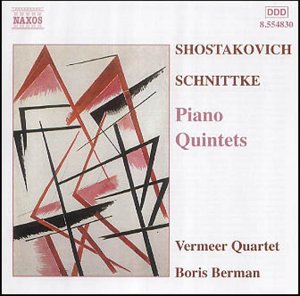These two works are not as strange bedfellows as they
might at first seem. Indeed, both are among the most personal statements
of their respective composers. Shostakovich often confided his most
intimate feelings in his chamber works, particularly so in his masterly
string quartets, the Second Piano Trio, the Viola Sonata and the Piano
Quintet Op.57 completed in 1940 after the mixed reception accorded
to his Sixth Symphony a few months earlier. Curiously enough, the Piano
Quintet was well received and was even awarded the Stalin Prize in 1941.
Such was the incoherence of the Stalinist Regime, and Shostakovich had
to face official approval as well as official disapproval for most of
his long composing career. The Piano Quintet clearly belongs to the
same musical and emotional world as the celebrated Fifth Symphony or
the undeservedly less popular Sixth Symphony. Its five movements encompass
a wide range of emotions expressed in clear, straightforward terms.
No wonder it has since remained a favourite among his chamber works.
Schnittke began his Piano Quintet in
1972 in the wake of his mother’s death to whose memory the work is dedicated,
but put it aside for several years and eventually completed it in 1975.
By that time, Schnittke’s polystylism, exacerbated in the First Symphony
and often predominant in many important works, has been assimilated
in a more coherent style often under the shadow of Mahler and Shostakovich
as in the Third and Fifth Symphonies. The five movements of the Piano
Quintet also reflect a wide emotional range and are sometimes tinged
with some bitter-sweet nostalgia as in the rather ghostly In Tempo
di Valse second movement or with refrained anger in other movements.
Some time later, Schnittke orchestrated his piano quintet as In
Memoriam. This is one of his most sincere, deeply moving major
works, in whatever version.
I find nothing to complain about this release. These
committed and well recorded readings have nevertheless to face some
competition, and there may be finer performances or subtler readings
of these pieces; but you need not hesitate if this particular coupling
appeals to you.
Hubert Culot


